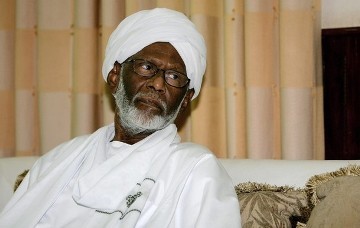Turabi says only Islamists capable of rising to power in Sudan
October 14, 2012 (KHARTOUM) – Sudan’s opposition leader Hassan al-Turabi has expressed confidence that Islamists are the only force that can rise to power in Sudan if a popular revolt occurs.

The PCP leader downplayed the clout of other opposition forces, saying that their bases of support are confined to small groups of the intellectual elite whereas Islamists are much more organized and command a great deal of grassroots support.
Al-Turabi went on to give a retrospective account of his early days in power as part of the ruling National Congress Party (NCP) before he was ousted less than ten years after masterminding the 1989 coup that brought his disciples-turned-enemies to power.
He said that Islamist governments in Sudan had achieved a number of valuable successes but also failed because it neglected to implement freedoms and unify people. He also admitted that power had corrupted many Islamists who, as soon as they had power, started amassing wealth and repressing opponents. “To them Islam became an empty slogan. They say what they don’t do.”
Al-Turabi said that if time went back to the point where they took power, he would act differently with regards to the policies of repression, power consolidation and the monopoly of public funds he admitted to pursuing.
He also advised fellow Islamists who rose to power in some Arab Spring countries to be wary of what he described as the corruptibility of power.
Turning to the domestic political situation, Al-Turabi said he has no doubts that the current regime is about to fall. However, he voiced concern over the future of the country in the event of a revolution especially if it took on regional dimensions.
“We fear that if the revolution ever happens, it would be on regional basis” he warned.
Since his ouster in 1999, Al-Turabi has been one of the government’s most vociferous critics and has been incarcerated a number of times.
He openly advocates regime change through a popular revolt and seldom expresses concerns over the possibility of a violent outcome in contrast with the leader of the opposition National Umma Party (NUP) Al-Sadiq al-Mahdi who repeatedly warns that a popular revolt might lead to the disintegration of the country in view of the armed rebel groups who are fighting the government in the peripheral regions of South Kordofan, Darfur and Blue Nile.
(ST)
